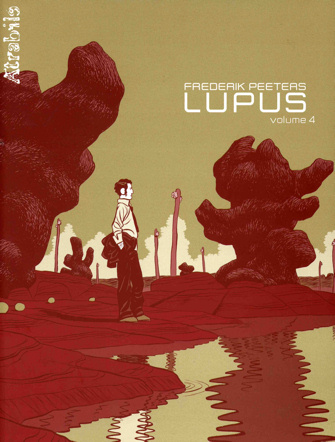 Home > Bart Beaty's Conversational Euro-Comics
Home > Bart Beaty's Conversational Euro-Comics Lupus Vol. 4, Frederik Peeters
posted February 21, 2007
Lupus Vol. 4, Frederik Peeters
posted February 21, 2007

 By Bart Beaty:
By Bart Beaty:
Since making a name for himself in the late-1990s with anthology pieces and his first albums (
Fromage Confiture,
Brendan Bellard),
Frederik Peeters has carved out a niche for himself that balances between genres, between styles and between publishers. Perhaps best known as the artist for the monster/adventure/children's series
Koma (written by
Pierre Wazem, Humanoides Associes), he is widely celebrated as the author of the autobiographical
tour de force Pilules Bleues (Atrabile, 2001). For six years when people ask me "What is the book that you think most needs to be translated from French to English?" my answer is always the same:
Pilules Bleues, the true story of a young man and his romance with a woman living with HIV.
Now, however, my answer might have to change. Peeters, five-time nominee at
Angouleme, is finally a winner, and with
the fourth and final volume of Lupus now available the time has arrived to re-evaluate the series as a whole. The question necessarily becomes: Has the young master finally topped himself?
In terms of subject matter,
Pilules Bleues has the obvious easy advantages of stark, powerful human drama. The very topic is something that causes people to sit up and take notice.
Lupus, on the other hand, lacks the simplicity of the high-concept pitch. If I were to sum it up in pithy terms I would probably go with:
Love and Rockets as told by the Swiss. Indeed,
Love and Rockets would be a better title for this book than for work of
Los Bros.
 Lupus
Lupus is the story of a twenty-something young man on an intergalactic fishing vacation with his friend, Ted. They roam from planet to exotic planet in their spaceship, doing drugs, eating local delicacies, meeting girls, and, um, fishing. This slackers in space comic, the first science fiction epic in which virtually nothing happens, is interrupted by the arrival of Sanaa, a young woman on the run from her billionaire father. In short order Lupus is smitten, Ted is tragically and violently killed, and the duo is on the run.
The second volume found Sanaa and Lupus hiding out in a commune run by aging anarchists on a hyper-organized retirement planet (a very Swiss vision of the future!), while the action of the third and fourth volumes takes place primarily on an abandoned space station hotel, where Lupus and Sanaa are in hiding awaiting the birth of her child. The fourth volume places the question of the paternity of the baby at the forefront (Lupus'? Ted's?), and also delves deeply into Lupus' psychological damage through a series of flashbacks in which his own issues with his parents take center stage. Again, not much happens in the way of plot (though a barely functioning service robot provides some humor) -- everything exists at the level of character.
Unlike
Jaime Hernandez or
Paul Pope, each of whom have mined the science fiction hipster comics story in the past, Peeters evinces almost no interest in genre trappings. Indeed, were I to learn that this story is largely autobiographical, I would be in no way surprised. This is a story of young men on the road to self-discovery, and the fourth volume finds Lupus thrust directly and sharply into the "adult world" (the cover, which depicts the character with a fresh haircut, suit and tie forms an ominous warning of things to come). But virtually every element here could have been played out in our mundane world, with distant planets replaced by Asian backpacking adventures, space ships replaced by buses and cars, and earthly trees replaced by, well, non-earthly ones. In short, this doesn't have to be a science fiction story, it just sort of wants to be one.

Where
Lupus surpasses
Pilules Bleues is in Peeters' greater facility with the form. Certainly his drawing,
Blutch-influenced but with a strong personality of its own, has never been better. He uses dramatic pacing much better here (gone, fortunately, are the nearly omnipresent voice-overs that detract from the first volume), especially in two instances where he drops out the art to highlight a dramatic transition. Everything about the cartoonist as story-teller has come together in this volume, as if he has finally reached a level of artistic maturity at the same time the Lupus leaves behind his own youthful predispositions. In this way,
Lupus is a profoundly moving work, and by the end of its 400 pages I felt that I had come to know and care about this character in a fashion that is all too rare in contemporary comics.
Is
Lupus a masterpiece? That's a very tough call. It is a beautifully realized comic-epic-romance of the type that would appeal strongly to American readers. Its easy juxtapositions of the mundane and the spectacular are genuinely moving and the completion of the story is wonderfully satisfying. This is both a well-crafted page-turner and a book that rewards multiple re-readings. Does that make it a masterpiece? I suppose it probably does.
Next time: Moving on to Angouleme's special prizes, with Best Fanzine winner:
Canicola
*****
Lupus Vol. 4, Frederik Peeters, Broche, 75 pages, 2940329230 (ISBN), March 2006
*****
To learn more about Dr. Beaty, or to contact him,
try here.
Those interested in buying comics talked about in Bart Beaty's articles might try
here or
here.


